Rights on Flights: the next big step in safe air travel for disabled passengers – Aircraft Interiors International
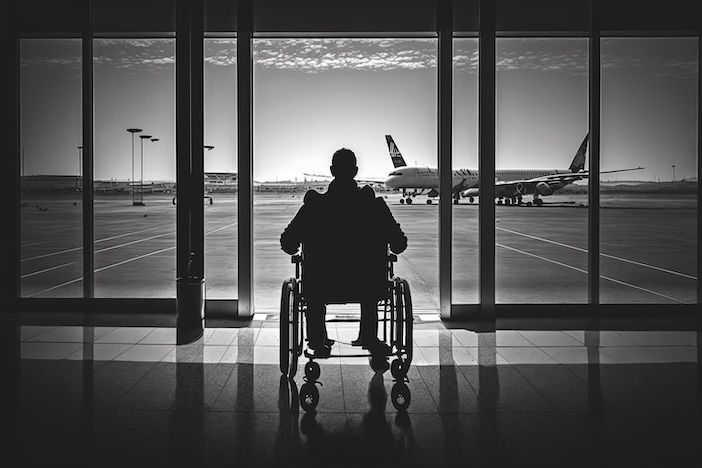
After years of well-intentioned discussions and sound bites from politicians and the aviation sector about improving the safety, accessibility and dignity of air travel for wheelchair users – but limited actions – real change could be imminent.
There are frequent news reports of PRM (passengers with reduced mobility) incidents such as wheelchairs and mobility devices being damaged in transit, inadequate assistance being provided to PRMs despite knowing it will be required, and passengers being forgotten after landing – the BBC’s Frank Gardner is no stranger to sitting in a dark and deserted cabin. A big problem is that some aviation bodies such as the UK’s CAA have limited influence in accessible air travel policy, and are relatively toothless when it comes to enforcement.
A group of campaigners, gathered under the banner of Rights On Flights, is calling for the air travel industry to be held accountable if it fails to meet the needs of disabled passengers. The campaigners have considered the changes that need to be implemented, and are asking for legislation to be passed, as measures such as charters and codes of conduct would not carry sufficient authority.
The starting point is a push for the UK Government to grant the CAA legal powers to fine airlines and other actors in the air travel sector if they fail to look after disabled passengers and their mobility devices, whether the harm is due to damage or neglect. This would help create an equal basis in air travel for persons with disabilities, including those with long-term physical, mental, intellectual or sensory impairments.
The campaign is led from the UK, but is also aiming for international effect. The main players in the campaign should be familiar to those with an interest in accessibility, featuring Chris Wood, founder of Flying Disabled; aviation accessibility consultants Roberto Castiglioni and Josh Wintersgill; accessibility campaigner Maayan Ziv; media expert Martyn Sibley; and campaigner, travel writer and TV presenter, Sophie Morgan (more information about these key figures can be found below).
An average of 32 wheelchairs a day of broken in the US air travel system alone. As Sophie Morgan says: “If non-disabled people were having their legs broken at the same rate that we are having our chairs broken, there would be an outcry. It’s safe to say we are in a crisis. So what do we do? Well, after my chair was broken earlier this year, I established Rights On Flights with the aim of raising awareness of the challenges we are facing, and also to create solutions.”
Rights On Flights has submitted a solution to the UK Government, in the form of the draft Assisted Air Travel Act, its provisions created in response to the experiences, knowledge and expertise gained from people with disabilities, combined with existing processes and procedures.
The draft was submitted on 14th September 2023 at the Houses of Parliament in London, to a big audience of supporters including Lords, Ministers, MPs, the US Department of Transport, aviation industry stakeholders such as IATA, airlines and service providers, as well as wheelchair manufacturers, aircraft interior designers, the disabled community and, of course, Aircraft Interiors International. There is now greater pressure being applied to parliament, and the UK Prime Minister, to consider the Act, and for the wider public to encourage their local ministers to add support.
“Enough is enough,” says Sophie Morgan, who initiated the campaign after her wheelchair was damaged beyond use during a flight – not the first time this had happened. “This is a short-term solution to an ongoing problem and the beginning of a long journey towards a whole system overhaul of the entire airline industry.”
“Disabled people need to be able to have the confidence to trust air travel. And this campaign is the first step,” she adds. “We are not asking for special treatment. We are asking for our experiences to match those of non-disabled people. How many more people need to get hurt, lose vital mobility equipment or even die before we see change?”
The latter point is not mere hyperbole: the tragic example of disability advocate Engracia Figueroa shows the extent of the issues that can arise from mishandled equipment.
Sophie Morgan’s latest work to show the extent of the problem is ‘Fight to Fly’, a documentary in which she sends a group of disabled travellers undercover to expose the injustices – and consequences – of inadequate service experienced when flying. The documentary is due to air on the UK’s Channel 4 on Monday 22nd July ay 9pm (you can watch a trailer HERE).
Five key tenets for effective air travel legislation
The draft Assisted Air Travel Act is based on five key tenets: harmonisation, inclusion, transparency, accessibility, and fairness.
Harmonisation is essential for the Act to be effective, eliminating legal discrepancies between jurisdictions and enabling easier adherence to compliance standards. A particular initial focus is on harmonisation between jurisdictions, particularly Europe and the USA.
As Morgan explains, “The long-term goal is to ensure greater alignment of international regulations, training, infrastructure (of airports and aircraft), technology and equipment that is reflective of what society expects. We want to ensure that the freedom of movement and consistency of assistance provided by airlines and airports is the same all around the world.”
The inclusion aspect seeks to ensure the disability community is properly represented in both supervision and decision-making roles, as well as providing more opportunities for disabled people to pursue a career in aviation. This aspect also covers vital points, such as regarding mobility aids as an extension of oneself, and creating processes around compensating for carers when they are essential for the journey.
Regarding transparency, the proposal fills in existing deficiencies and implements improved processes and guidelines to guarantee a fair playing field for all involved (including regulators), with all ambiguities and interpretive elements removed.
The accessibility aspect of the proposal brings in the practical element, outlining distinct rules for both the built and aircraft environments, all with the aim of enabling the aviation industry to become wholly accessible. By taking advantage of technological innovation, the aim is to achieve a setting in which people with disabilities can maintain their autonomy if they prefer. Examples include provisions for armrests and lavs (see below). Never again will passengers be carried around by crew, unless in an emergency.
The pillar of fairness brings in distinct disembarkation times that must be established for both single- and twin-aisle aircraft. The Complaint Resolution Official, an experienced member of staff with the power to address any passenger issues as they occur, would ensure fairness in the recovery process. There is fairness for carriers too, with a two-tiered enforcement process that gives first-time offenders the chance to learn from their mistakes without facing a penalty.
The approach is designed to be both effective and fair, with effort made to ensure compliance does not represent an engineering or financial hurdle for operators. No doubt the draft Act will undergo some modifications, but Rights for Flights sees it as a viable catalyst for change.
As aviation accessibility consultant Josh Wintersgill says, “There is no doubt that when we look back in history, 50 years from today, 2023 will go down as the start of a new beginning for assisted air travel. We hope that our proposal will serve as an inspiring catalyst, motivating other nations in Europe and beyond to craft robust legislative measures, ensuring safe and dignified air travel for everyone.”
Mobility aid airworthiness
The draft Assisted Air Travel Act stipulates that air carriers, airframe manufacturers, wheelchair manufacturers, and the dangerous goods department of relevant national enforcement bodies, must convene in a working group tasked with creating an airworthiness standard for mobility aids.
If the Act is passed into law, then the group will be required to publish such standards within two years of its entry into force. Five years after the publication of wheelchair airworthiness standards, air carriers will then have the right to deny carriage of non-compliant mobility aids.
Requirements for the cabin
The Rights On Flights team has taken a light approach to stipulating changes in the cabin, appreciating the myriad considerations, from certification to cabin density. For example, the Assisted Air Travel Act would require that air carriers ensure that aircraft with 30 or more seats have movable armrests on at least one half of the aisle seats.
All twin-aisle aircraft would have to be fitted with at least one accessible lav, and all new single-aisles with more than 125 seats would need to have at least one accessible lav from 1st January, 2025. New single-aisles and twin-aisles would also have to be fitted with at least four spaces to accommodate passengers who need to remain in their mobility aid, such as a power chair, provided that mobility aid meets airworthiness standards, within three years from the certification date of a suitable anchoring system.

Carriers would also have to that ensure that aircraft with more than 60 passenger seats, regardless of whether they are fitted with an accessible lav, are equipped with an on-board wheelchair with footrests, headrests and armrests that are movable or removable, adequate occupant restraint systems, a backrest height that permits assistance during transfers, and a means to prevent chair movement during transfer or turbulence. Carriers would also have to ensure a sliding board is available, to facilitate safe transfer from the seat to the aisle chair and vice versa.
Stowage stipulations
There is also provision for the onboard stowage of wheelchairs, mobility aids, and other assistive devices.
On aircraft with more than 100 seats, carriers would have to provide a priority space in the cabin of sufficient size to stow at least one typical adult-sized folding, collapsible, or breakdown manual passenger wheelchair (13x36x42in) without having to remove any components.
And a big one, given that the US air travel sector alone is responsible for breaking an average of 32 wheelchairs a day: both air carriers and airport managing bodies must ensure that means are available to securely transfer and stow mobility aids, and avoid all forms of hand-carrying of power wheelchairs and other large mobility aids, to minimise the risk of damage.
They must also ensure that mobility aids are loaded securely in the cargo hold prior to departure, and notify the passenger of that fact. They must also ensure the timely return of wheelchairs and other mobility aids
after landing.
Photos or videos showing the condition of the mobility aid at check-in and prior to its return to the passenger upon landing will help resolve any issues of liability. In the event of any damage or loss, air carriers have to provide prompt assistance in remedying the situation, such as the temporary provision of suitable mobility equipment.
The way forward
The terms of the Act are reasonable, and would go a long way toward creating a more equal passenger experience for disabled passengers. Many designs and proposals already exist that would make provision of the armrests, stowages and PRM-accessible lavs a simple proposition. The Act is a draft, and the Rights on Flights team are happy to discuss its terms – that tenet of fairness in the provisions also extends to their mindset. They know they have a fight ahead, but they want the outcome to be the same for the industry as for disabled flyers: fair.
Perhaps Sophie Morgan sums it up best: “The space where we are most vulnerable, where we don’t have robust enough laws in place to protect us, is in air travel. Personally, when flying, I’ve been ignored, abandoned, abused, dehumanised and humiliated. And I’ve had my chair broken on more than one occasion. And I know
I’m not alone… The Assisted Air Travel Act could put an end to the need to fight for our rights on flights. This act could usher in a paradigm shift in how disabled people travel.”
More information…
Big players in the Rights on Flights campaign
Sophie Morgan

Sophie Morgan is the founder of Rights on Flights, and is a familiar face in the UK, as she has been a TV presenter for almost 20 years, of everything from reality TV and documentaries, to the Summer Paralympics. She is perhaps the best-known disability advocate in the UK. “Air travel transcends mere convenience; it is a fundamental human right,” she says.
Chris Wood
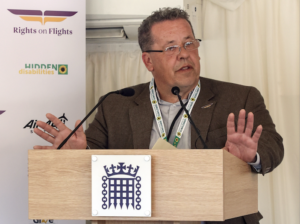 Founder of the Flying Disabled consultancy, Chris Wood has been an accessibility campaigner and lobbyist for nearly 30 years, and was a key driver in creating the Air4All wheelchair securement concept for aircraft.
Founder of the Flying Disabled consultancy, Chris Wood has been an accessibility campaigner and lobbyist for nearly 30 years, and was a key driver in creating the Air4All wheelchair securement concept for aircraft.
Roberto Castiglioni
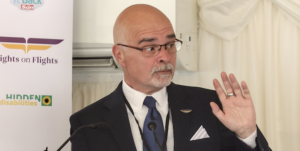 Roberto Castiglioni’s passion and expertise in accessible air travel is known around the world, as he has provided consulting services to everyone from airlines, airports and PRM service providers, to the European Parliament and the European Commission. He also has considerable practical experience, having been a member of the UK Civil Aviation Authority Access Panel since 2012, and chaired the Heathrow Access Advisory Group.
Roberto Castiglioni’s passion and expertise in accessible air travel is known around the world, as he has provided consulting services to everyone from airlines, airports and PRM service providers, to the European Parliament and the European Commission. He also has considerable practical experience, having been a member of the UK Civil Aviation Authority Access Panel since 2012, and chaired the Heathrow Access Advisory Group.
Josh Wintersgill
 Entrepreneur Josh Wintersgill advises aviation companies around the world on accessibility issues, and has been involved in many projects, including inventing AbleMove, a design that enables wheelchair users to transfer safety out of a wheelchair and into an aircraft seat – a product now recognised by major airlines such as easyJet. His energy is also put into training in air rifle shooting, and he hopes to represent Great Britain at the 2028 Paralympic Games in Los Angeles.
Entrepreneur Josh Wintersgill advises aviation companies around the world on accessibility issues, and has been involved in many projects, including inventing AbleMove, a design that enables wheelchair users to transfer safety out of a wheelchair and into an aircraft seat – a product now recognised by major airlines such as easyJet. His energy is also put into training in air rifle shooting, and he hopes to represent Great Britain at the 2028 Paralympic Games in Los Angeles.
Maayan Ziv
 Maayan Ziv is an accessibility campaigner, and the CEO of AccessNow, a company that has developed an accessibility app. She hit the headlines in 2022 when Air Canada damaged her wheelchair during her flight from Toronto to Tel Aviv – to attend an accessibility conference.
Maayan Ziv is an accessibility campaigner, and the CEO of AccessNow, a company that has developed an accessibility app. She hit the headlines in 2022 when Air Canada damaged her wheelchair during her flight from Toronto to Tel Aviv – to attend an accessibility conference.
Martyn Sibley
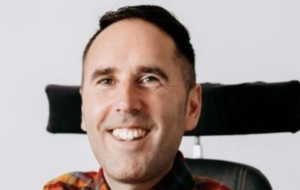 Growing up with a physical disability, Martyn has faced many personal challenges, and successfully chased down many dreams. After gaining a degree in economics and a master’s in marketing, Martyn started his career at a charity for disability rights. Following his love of blogging and social media, he quickly became a disabled influencer (voted regularly in the UK’s disability power 100 list), and also works in media and tourism for social change. He is a published author (Everything is Possible – travel memoir), an international speaker, media spokesperson, appeared in the LinkedIn TV advert in 2021, and has published many blogs, vlogs and podcasts.
Growing up with a physical disability, Martyn has faced many personal challenges, and successfully chased down many dreams. After gaining a degree in economics and a master’s in marketing, Martyn started his career at a charity for disability rights. Following his love of blogging and social media, he quickly became a disabled influencer (voted regularly in the UK’s disability power 100 list), and also works in media and tourism for social change. He is a published author (Everything is Possible – travel memoir), an international speaker, media spokesperson, appeared in the LinkedIn TV advert in 2021, and has published many blogs, vlogs and podcasts.
Jet Gates
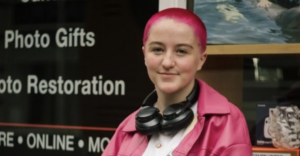 Having worked in the marketing and social media industry for nearly 6 years, Jet brings valuable experience to the Rights on Flights as social media manager. As a disability activist, content creator and accessibility consultant, Jet is able to use these skills to create engaging and relatable content.
Having worked in the marketing and social media industry for nearly 6 years, Jet brings valuable experience to the Rights on Flights as social media manager. As a disability activist, content creator and accessibility consultant, Jet is able to use these skills to create engaging and relatable content.
Air4All: a solution in the pipeline
The Air4All design started as a concept but is beginning to look a lot like an enabler for accessibility legislation. The flexible aircraft seat design is intended to enable customers who use a powered wheelchair to remain in their own wheelchairs for the entire journey. The seat functions as a standard passenger seat, but when required by a wheelchair user, it can be converted to accommodate and secure a chair during flight.
The design has been developed by a UK-based consortium comprising Flying Disabled (Chris Wood is the founder), PriestmanGoode and SWS, and earlier this year it received backing from Delta Flight Products (DFP), a subsidiary of Delta Air Lines.
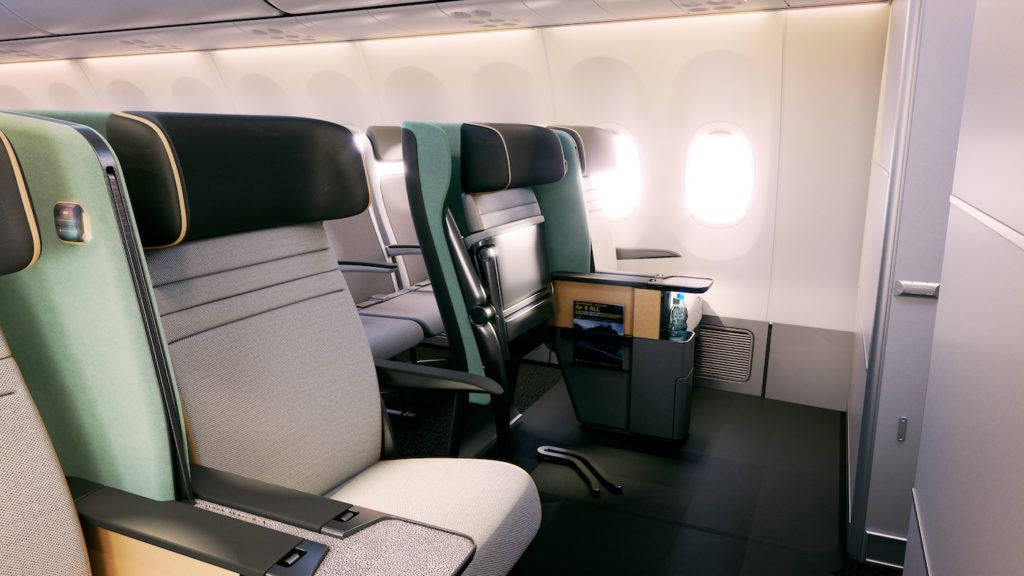
The Air4All system provides access to a headrest, centre console, tray tables and cocktail table, which can be adjusted so they are also available when a wheelchair has been rolled into place. The product also enables airlines to retain the design of their cabin on every seat. The design partners also say that implementation of the seat facilitates a more seamless boarding and disembarking experience for passengers with reduced mobility – and that it does not result in a loss of cabin seat count.
Delta Flight Products showed an updated Air4All design at Aircraft Interiors Expo 2024.
The design holds promise, and research from the Air4All consortium suggests that such measures could attract more wheelchair users towards air travel, helping the aviation industry benefit from a previously untapped global disability spend of around US$13 trillion.
The next big news from the Air4All project? Chris Wood says that it will be fitted on board Air Force One.
This video shows how Air4All works.
Political views
Lord Blunkett
Lord Blunkett is a backer of the draft Assisted Air Travel Act, adding further weight to the political supporters, who also include the UK Prime Minister, Sir Keir Starmer. While Lord Blunkett retired from politics in 2015, having served in positions including Home Secretary, he remains an influential figure in politics, and he and his guide dog, Barley, are familiar figures in Parliament.
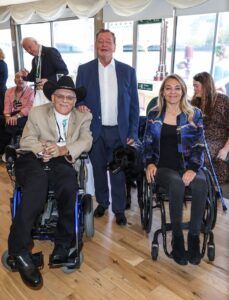
He is fully behind Rights for Flights, which he believes will have far-reaching benefits. “Getting it right for individuals is also getting it right for the wider community, because I strongly believe that if we get things much improved for those with assisted travel needs, we’re going to transform the passenger journey for everyone else as well. Because the attention, the focus, the stiletto heel of pressure in terms of improving that experience, helps everybody. So I think it’s a win-win. And if we can get that across, it won’t be seen as a fringe issue for a minority of travellers, it will be seen as something that is an imperative for everybody.”
As a politician Lord Blunkett has experience of smoothing difficult situations. So how would he advise that Rights on Flights handles airlines and airports that are resistant to implementing the necessary changes?
“We really need to have a two-way street of having the necessary warmth when dealing with those who won’t cooperate, whilst protecting and enhancing the reputation of those who do,” he says.
Blunkett believes that legislation is key to improving accessibility for the built travel environment, giving the necessary impetus to key players. And he thinks the Assisted Air Travel Act fits the bill: “There is firstly prevention, secondly redress, and thirdly penalties, where needed, in order to get compliance. If we can get those three together, then we have a chance of success.”
Developments in the USA
Kelly Buckland is disability policy adviser at the US DOT. His attendance at Westminster was no small thing, as it was one of the first flights he had taken in a long time. The reason? He considers air travel to be dangerous for disabled passengers.
“We are making efforts in the USA to make air travel safe and accessible. Because right now for people who use wheelchairs, it’s neither,” he says.
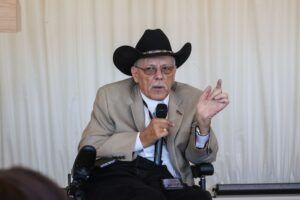
Buckland was appointed to his position in September 2021, and since then he has been developing a set of policies. He has been successful, with achievements including the Airline Passengers with Disabilities Bill of Rights.
The bill includes 10 protected rights, including the right to be treated with dignity and respect, the right to assistance on board aircraft, the right to receive seating accommodations, and the right to accessible aircraft features. For the cabin sector, one of the biggest developments is the ruling that new single-aisle aircraft will require accessible onboard lavatories.
Buckland’s team is also working on a Notice of Proposed Rulemaking that will require safe transfers, from wheelchair to aisle chair, to aircraft seat. Damaging a wheelchair would be a violation of law. More work is going into enabling wheelchair users to remain in their chairs on flights. A three-year roadmap is underway with the FAA, researching the engineering of wheelchairs, what will be required for them to be safe to use on airplanes, how they will be secured, and what standards would be appropriate.
He expects another rulemaking to require wheelchair docks to be made available on planes, including as part of cabin retrofits, with Air4All being a likely design direction.
He believes that if more countries adopt legislation similar to the Assisted Air Travel Act then “people with disabilities, especially those who use wheelchairs, can fly freely to any country they want to”.
Troubling research
Louise Rubin is head of policy and campaigns at SCOPE, the disability equality charity that campaigns to make life better and easier for the UK’s 16 million disabled people. The charity polled over 1,000 disabled adults in the summer and found that one in three who have flown have had to make an accessibility complaint, and one in eight have decided to stop flying altogether because they fear their equipment or medication will be lost.
“It’s clear that change is needed, and it’s needed now,” she says. “Disabled people can’t wait any longer. We hope that legislation will come forward quickly, giving disabled people the confidence they need. But in the meantime, we encourage the airlines to press on. There is a lot they can do now to improve accessibility.”
Related
Turkish Airlines and Qatar Airways Suspend Mogadishu Flights Following US…
Home » Airlines News of Qatar » Turkish Airlines and Qatar Airways Suspend Mogadishu Flights Following US Embassy Terror Alert, Raising Security Concerns at
Local tourism destinations grow fast
Men sit at the Doha Corniche backdropped by high buildings in Doha on March 3, 2025. Photo by KARIM JAAFAR / AFP DOHA: Local tourism destinations are g
Hajj, Umrah service: Qatar Airways introduces off-airport check-in for pilgrims
Image credit: Supplied Qatar Airways has introduced an off-airport check-in
IAG, Qatar Airways, Riyadh Air, Turkish Airlines, Lufthansa & more…
Turkish Airlines – a Corporate Partner of the FTE Digital, Innovation & Startup Hub – is charting a course to rank among the top 3 global airlines for












